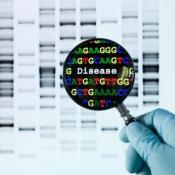Human Molecular Genetics and Genomics — Important Advances and Exciting Possibilities
By Francis S. Collins, M.D., Ph.D., Jennifer A. Doudna, Ph.D., Eric S. Lander, Ph.D., and Charles N. Rotimi, Ph.D.,
The New England Journal of Medicine
| 01. 07. 2021
The breathtaking progress in molecular genetics that has occurred over the past five decades and the transition to genomic medicine would have been difficult to imagine in 1970, when the Institute of Medicine (IOM), now the National Academy of Medicine (NAM), was formed. The term “genomics” hadn’t yet been coined, the tools and technologies that are the foundation of modern biotechnology were in their infancy, and methods for sequencing even a few nucleotides were barely workable.1
The IOM’s early years coincided with paradigm-shifting discoveries related to DNA, as biologic research swiftly incorporated Boyer and Cohen’s recombinant method, Sanger’s DNA-sequencing work, and Mullis’s introduction of polymerase chain reaction (PCR) technology (see timeline). Yet even against this backdrop, the notion of a “big science” endeavor to sequence the human genome seemed radical.
In 1987, the New York Times Magazine characterized the Human Genome Project as the “biggest, costliest, most provocative biomedical research project in history.”2 But in the years between the project’s launch in 1990 and its completion in 2003, genomic technology advanced dramatically. DNA-sequencing throughput increased from 1000...
Related Articles
By Diaa Hadid and Shweta Desai, NPR | 01.29.2026
MUMBRA, India — The afternoon sun shines on the woman in a commuter-town café, highlighting her almond-shaped eyes and pale skin, a look often sought after by couples who need an egg to have a baby.
"I have good eggs,"...
By George Janes, BioNews | 01.12.2026
A heart attack patient has become the first person to be treated in a clinical trial of an experimental gene therapy, which aims to strengthen blood vessels after coronary bypass surgery.
Coronary artery bypass surgery is performed to treat...
By Staff, ScienceDaily | 01.05.2026
Scientists at UNSW Sydney have developed a new form of CRISPR technology that could make gene therapy safer while also resolving a decades-long debate about how genes are switched off. The research shows that small chemical markers attached to DNA
...
Following a long-standing CGS tradition, we present a selection of our favorite Biopolitical Times posts of the past year.
In 2025, we published up to four posts every month, written by 12 authors (staff, consultants and allies), some in collaboration and one simply credited to CGS.
These titles are presented in chronological order, except for three In Memoriam notices, which follow. Many more posts that are worth your time can be found in the archive. Scroll down and “VIEW...




